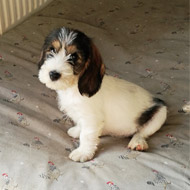
Figures show profound effect of DNA test on Vendeen puppies
A 10-week-old puppy has been saved from blindness thanks to a simple DNA test created by the Animal Health Trust (AHT).
Clover, a Petit Basset Griffon Vendeen, was susceptible to primary open angle glaucoma (POAG) - a painful condition which leads to complete loss of sight.
Three years ago the AHT devised a test for the condition which, at the time, affected around 1 in 20 Vendeen puppies. Since then, some 1800 puppies have been tested worldwide, and in the UK no puppies have been recorded as affected.
The statistics, released to coincide with the AHT's Cures4Paws week, show the profound effect a simple DNA is having on the health of this much-loved breed.
Dr Cathryn Mellersh, head of canine genetics at the AHT, said: “Years of work went into developing this DNA test which makes it even more rewarding to see it used so well to stop these lovely dogs from going blind. Glaucoma is a very debilitating and painful disease and some dogs have to their eyes removed as a result.
“We are studying glaucoma, and many other blinding diseases, in lots of dog breeds. These mutations can also affect crossbred as well as purebred dogs, so as the popularity of crossbred dogs continues to rise, DNA health testing is more important than ever to make sure you’re breeding or buying, puppies that are going to have the very best start in life.
“Great things can be achieved through genetic research and as humans suffer many of the same diseases as dogs, there is always the possibility that our research is going to help human medicine as well.”
Image (C) AHT



 The Veterinary Medicines Directorate (VMD) is inviting applications from veterinary students to attend a one-week extramural studies (EMS) placement in July 2026.
The Veterinary Medicines Directorate (VMD) is inviting applications from veterinary students to attend a one-week extramural studies (EMS) placement in July 2026.